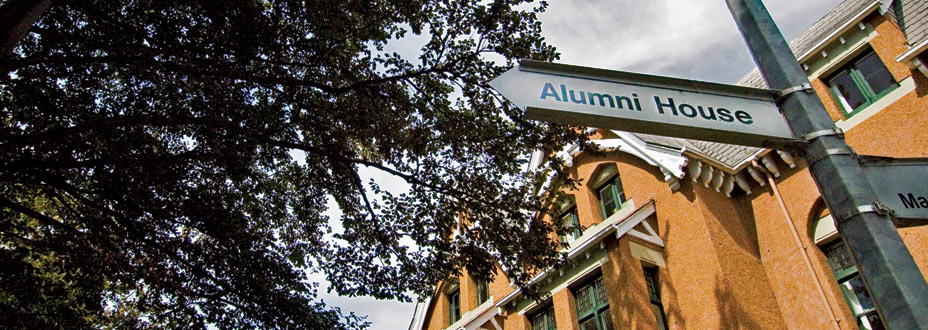
Alumni news
Q&A
with Josh Jenkins
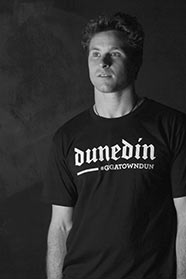 Josh Jenkins thinks Dunedin is the greatest place in the world – and every day he gets to tell people about it. With a Bachelor of Tourism, he began his career at Monarch Wildlife Cruises on Dunedin's Otago Peninsula, where he learnt about the region's unique and rare wildlife. From there, he went to Tourism Dunedin. Beginning in a research role, he moved to the position of digital marketing co-ordinator, responsible for managing, developing and marketing Dunedin's digital assets. Highlights for Josh include developing dunedinnz.com, launching the Insiders Dunedin website insidersdunedin.co.nz and hosting Dunedin surfing trips for international surfing photographers Chris Burkard and Eugene Tan.
Josh Jenkins thinks Dunedin is the greatest place in the world – and every day he gets to tell people about it. With a Bachelor of Tourism, he began his career at Monarch Wildlife Cruises on Dunedin's Otago Peninsula, where he learnt about the region's unique and rare wildlife. From there, he went to Tourism Dunedin. Beginning in a research role, he moved to the position of digital marketing co-ordinator, responsible for managing, developing and marketing Dunedin's digital assets. Highlights for Josh include developing dunedinnz.com, launching the Insiders Dunedin website insidersdunedin.co.nz and hosting Dunedin surfing trips for international surfing photographers Chris Burkard and Eugene Tan.
Responsible for Dunedin's social media, he says: “Yes, I get to spend a lot of time on Facebook and Twitter. I also help develop mobile applications and implement marketing campaigns. The greatest thing of all is that I work with people from all walks of life and companies from all over the world. I never get bored as no two days are ever the same. I couldn't have asked for a better entry into my career in tourism!”
Now at The Digital Office, Josh's latest project is Gigatown Dunedin, a competition to win the fastest internet in the Southern Hemisphere.
How did Otago help shape your life and career success?
The skills I learnt at Otago set me up for the “real world”. But I think the University of Otago helped shape my life and career more than most because I met my wife while studying and we've started a family here in Dunedin. Now I'm hoping to help give something back with the Gigatown competition. If Dunedin wins then it'll change the digital landscape for Otago and students studying here.
Highlights or best memories of your university days?
I have so many wonderful memories of my uni days and, at the heart of all those memories, are the people I enjoyed them with. A few standouts include flatting in The Growler on Clyde Street, the valley cats and numerous parties.
Recollections of favourite or stand-out lecturers?
My third-year lecturer David Duval always had time for me and other tourism students. He always had something positive to say, but challenged my thinking with critical feedback. We are still in contact, which is cool.
What do you remember about your residential college or flatting experience?
The social interactions I got from flatting in Dunedin have helped shape me into the person I am today. I don't think that experience could have been replicated anywhere else in New Zealand.
Do you have memories or impressions of Dunedin that you'd like to share?
Choosing to live in Dunedin after graduating helped me realise how great this little city is. I never really got out of the north end of town while I was studying and I know a lot of other students didn't. I'd recommend that alumni come back to Dunedin and spend at least a week here exploring the wider area, including Otago Peninsula.
What do you remember of your graduation day?
For me graduation was a day to celebrate my successes with family. Walking across the stage and shaking the Chancellor's hand was very satisfying.
Personal highlights?
Personal highlights since leaving University include starting a family, buying a house, overseas travel and, most recently, winning a Mixed Martial Arts Fight.
Plans/goals for the future?
Dunedin's bid for Gigatown is the focus for the next year. Winning this competition will help students, the business community, and the University in years to come. I'd also like to start a business and head back to Otago to complete a master's degree.
You can check out photos of your old uni flats on the “groups” page of insidersdunedin.co.nz
Q&A
with Mark Orton
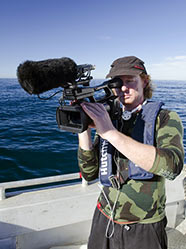 Mark Orton is an alumnus of Film and Media Studies and has a Postgraduate Diploma in Natural History Filmmaking and Communication. He's learned about the history of filmmaking and how to make films for a TV audience. He's worked behind the camera and the editing desk on documentaries for Natural History New Zealand, the Discovery Channel, National Geographic and TVNZ-screened shows such as High Country Rescue. Now, he's on location for four months, working on a series for the Al Jazeera network on life in the Manila slums.
Mark Orton is an alumnus of Film and Media Studies and has a Postgraduate Diploma in Natural History Filmmaking and Communication. He's learned about the history of filmmaking and how to make films for a TV audience. He's worked behind the camera and the editing desk on documentaries for Natural History New Zealand, the Discovery Channel, National Geographic and TVNZ-screened shows such as High Country Rescue. Now, he's on location for four months, working on a series for the Al Jazeera network on life in the Manila slums.
With the working title The Slums, Mark says the new series is about “the lives of people living in an area called The Tondo. It's gritty, gnarly, heartbreaking, and incredibly amusing all at the same time.
“The living conditions of the urban poor in a city like Manila is such a cultural shock. But you can't help admire these people. Not only are they incredibly tough and resourceful, they are really warm and love to laugh. Yes, it's dangerous but the people are so welcoming and curious that it's easy to forget that the camera I am holding is worth more than they will earn in a very long time.
“Hopefully, by allowing some of them to tell their stories through this medium, people will not only realise how lucky they are, but think of ways to help rather than pretend that this scenario doesn't exist”.
How has your Otago degree prepared you for what you're doing now?
My undergraduate degree in Film and Media, with a bit of English, History and Communication Studies thrown in was great preparation. Generally, you can teach anyone with half a brain to use the equipment; what is rare, though, are people that can problem-solve on the spot, think outside the square and tell stories without having their hand held every step of the way.
I particularly value the thought-provoking lectures that I had in the Department of Film and Media Studies, firstly by Thierry Jutel and then by Brett Nicholls, Vijay Devadas and Paul Ramaeker. I often think that the modern generation of film editors (myself included) have so much to learn from those that did the hard yards splicing celluloid and the great thing about learning film and media the way I did at the University of Otago was that it wasn't a technical course on how to press buttons. It taught me to look at images, deconstruct film texts and, importantly, understand how sequences were constructed.
What did you enjoy most about your studies?
Being exposed to new ways of thinking and introduced to texts that I might never have found on my own. A door was opened to critical thinking that can never shut and it gave me the confidence to think that I could pretty much do anything if I was never afraid to ask questions. I muddled though my 20s in a number of totally soul-deflating jobs, so I have had to make up for lost time once shown the door into a world infinitely more interesting.
What piece of advice would you like to share with new students?
Get stuck in, don't be afraid to ask questions and, importantly, don't view your undergraduate years as a stepping-stone to employment. That will happen soon enough, but this might just be the last chance that you get to think freely, try stuff, surround yourself with an eclectic mix of people without the worries of mortgages etc. Dunedin is a very cool town and, surprisingly, it is a lot larger than the North Dunedin student ghetto – so get out, explore and soak up the amazing natural beauty of the place. Even better, get to know people in the city that aren't students and respect the city.
What does Otago mean to you now?
It's home now. The University enticed me to Dunedin and, in many respects, I have never left. Until recently, Dunedin was still my home, but my University of Otago experience had another profound effect on me. I met my partner Tracy (who was working at the University) while I was an undergraduate student and 10 years later we haven't really moved too far away – just to Clyde, Central Otago.
For the full feature, further Q&A and video with Mark, please visit our website.
Postcard from the Gambia
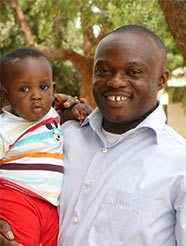 Working with children in the Gambia, Dr Uzochukwu (Uzoh) Egere is doing what he loves: caring for children and easing “the intolerable burden of disease” around him, “especially … among our precious children”.
Working with children in the Gambia, Dr Uzochukwu (Uzoh) Egere is doing what he loves: caring for children and easing “the intolerable burden of disease” around him, “especially … among our precious children”.
Uzoh is the Centre for International Health's first Master of Public Health graduate, describing this as the springboard he needed to do the work he loves, giving him “lifelong tools for tackling health challenges in the developing world”.
Uzoh's life now is a quantum leap from earlier, haunting days of caring for sick and dying children. Then he felt helpless because, while he was beginning to understand the multifaceted causes of disease in African children, he could only offer bedside care. Now, however, he works with “zeal” in a team investigating vaccines for pneumococcal diseases, which are major killers of children in Africa.
He also works on the African Medical Research Unit's tuberculosis team in the Gambia, improving the diagnosis and management of childhood tuberculosis. “This brings together my 'bush' and 'bedside' skills which have been shaped over the last six years through my public health training at the University of Otago and my work at the Medical Research Unit in the Gambia”.
Uzoh's passion for his vocation is palpable. “I aim at continuing to acquire knowledge and skills necessary for making quality contributions to local and global efforts to reduce the burden of disease on children, especially in places where this is needed the most.”
Postcard from Quarantine Island
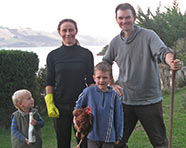 Riding a motorboat to the nearest road, no broadband internet, no other humans within driving distance, and little shags nesting near the doorstep are all part of life for alumna Anna Hughes and partner Wayne Johnson.
Riding a motorboat to the nearest road, no broadband internet, no other humans within driving distance, and little shags nesting near the doorstep are all part of life for alumna Anna Hughes and partner Wayne Johnson.
As official caretakers of Quarantine Island, situated in Otago Harbour, Anna and Wayne live on land otherwise uninhabited by humans – however, their constant companions are 33 sheep, hens and an abundance of relatively tame native wildlife. The island's only – and quite docile – predator is the Norwegian rat, which keeps mice and the more aggressive ship rat at bay.
Caretaking is only part of Anna and Wayne's job – they spend much of their time hosting local education groups, planting and caring for native trees, farming, and ensuring that the water and waste systems are working effectively.
“There have been some lowlights such as winter,” says Anna. "Climbing down a steel ladder on frosty mornings, pumping water out of the boat and driving it across the harbour is a chilly way to take the kids to school. Living in an uninsualted house built in the early 1900s and maintained on a budget is also a challenge. However, this has provided some ideas around retrofitting the old cottage to show it can be made to be energy efficient. A future goal perhaps!
“It's been a real privilege,” she says. “We now agree with St Martin Island Community Founder Rev. James Matheson's belief that 'Every city needs an island'.”
Alumni benefits
Upcoming celebrations and reunions
Library membership
You can use the University libraries for reading, writing, research and relaxation.
Reunion organisation
Do you need help organising your class/college/flat/University sport reunion? Contact reunions.alumni@otago.ac.nz
Career development and advice
Whether you are currently searching for a position, considering a career change, or are seeking fresh talent for your business, Otago's Career Development Centre can help.
Contact alumni
Get back in touch with lost friends, flatmates and colleagues from your student days by emailing alumni@otago.ac.nz
Executive Residence
Stay in the heart of campus at the University's Executive Residence at an exclusive alumni rate. Telephone 0800 685 685.
IT training courses
Short IT courses on campus are now available to alumni. Some are free and all others receive a special alumni discount of 15 per cent. Go to the website for a list of courses.
Flora Finder giveaway
Flora Finder is a new mobile app created at Otago, providing snappy identification of New Zealand native plants using a smartphone camera. It builds a collection and identifies the plant's location.
Developed by the University's Otago Innovation Ltd, the Department of Botany and MEA Mobile, there are 87 species in the app. If your plant isn't one of those 87, a pic can be emailed to the Botany Department for identification.
Botany alumnus and Otago Innovation commercialisation manager Graham Strong says: "This is an amazing additional service for an app that will cost only $4.99. Not only do you get an app that will identify New Zealand native plants, it will also give access to Otago experts."
Watch the Flora Finder video on YouTube.
Otago Innovation is giving away Flora Finder to 10 lucky alumni. To enter the draw, email alumni@otago.ac.nz with the subject line “Flora Finder”.
Where in the world are you?
Email your 100-word “postcard” to alumni@otago.ac.nz
Otago has more than 90,000 contactable alumni living in 140 countries. We want to stay in contact with you wherever you are. Visit alumni.otago.ac.nz/where-in-the-world-are-you to find out where Otago graduates take their place in the world. While you are there you can update your profile, find lost friends and check for almuni events in your area.
